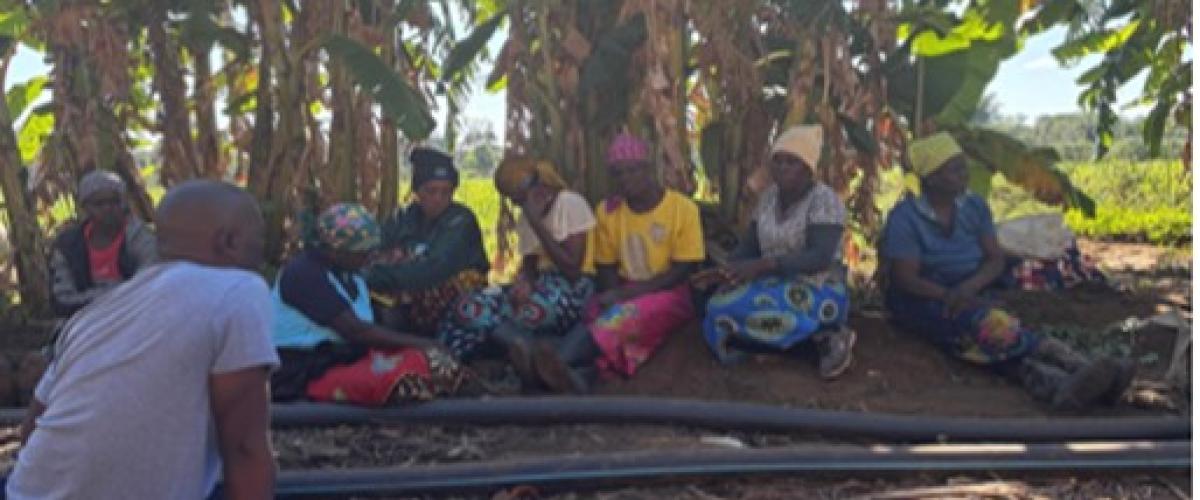
In May 2025, the Communicating One Health (OH) through Science, Art and Society (CASCOH) initiative was launched in Massingir district, Mozambique, to strengthen community-level understanding of zoonotic diseases. Rooted in a participatory, bottom-up approach, the project blends scientific research with creative communication, bringing together local communities, researchers, and artists to rethink how One Health messages are shared and understood.
CASCOH is implemented in collaboration with communities living around the Limpopo National Park (LNP), researchers from Eduardo Mondlane University (UEM) and the Institute of Agricultural Research of Mozambique (IIAM), and the local theatre group Tilapia Star, supported by the Franco-Mozambican National Cultural Centre. Its unique design integrates two components: a scientific research phase and an intervention phase that will translate scientific findings into interactive theatre based on Teatro dos Oprimidos (Theatre of the Oppressed) techniques.
This article presents key preliminary results from the research component.
Understanding local perceptions of Zoonotic Diseases
Between June and September 2025, researchers conducted an in-depth assessment of community perceptions, knowledge, and practices related to zoonotic diseases. The study involved:
- 8 focus group discussions with household heads
- 32 semi-structured interviews with key informants
- A survey of 334 households across four communities:
- Mavoze (inside the LNP)
- Chibotane and Bingo (buffer zone)
- Cubo (outside the LNP)
The goal was to understand local knowledge gaps and identify information needs related to diseases transmitted between animals and humans.
Limited awareness of zoonotic diseases
Most participants were not aware of the different zoonotic diseases arising from interactions between humans and animals, although they did acknowledge that animals, both domestic and wild, can transmit illnesses. Domestic animals, particularly pigs and dogs were frequently cited as sources of disease. Dogs were mainly associated with rabies, while pigs were linked to fever, cough, flu, diarrhea, and even tuberculosis.
Wild animals such as elephants, buffalo, and hippopotamuses were believed to spread disease to humans and livestock due to shared water sources, air, and spaces. Crop destruction by wildlife was also perceived as having negative effects on human health.
Contradictory perceptions about disease transmission
While 46% of respondents believed humans can contract diseases from domestic animals, especially through meat or milk consumption, physical contact, or shared air, 44% believed such transmission does not occur at all. Furthermore, 73% said humans do not transmit diseases back to domestic or wild animals.
Wild meat consumption was common, with 74% reporting they consume it, but few associated it with disease risks. Behaviours that increase exposure to disease such as drinking untreated water, poor hygiene, and open defecation were widespread but not perceived as health risks by most respondents.
Rabies: known but misunderstood
Rabies emerged as one of the best-known zoonotic diseases across communities. Respondents understood the importance of vaccinating dogs and expressed willingness to do so. However, adherence to vaccination depended largely on government campaigns, which are not always conducted regularly.
A few critical gaps were identified:
- Rabies was only associated with dogs; communities did not know that cats can transmit it too.
- Suspected rabid dogs were usually killed and discarded (burned, buried, or thrown into the bush) without veterinary assessment.
- While many respondents sought medical care after a dog bite, others relied on traditional healers or plant-based remedies, after washing the wound with soap and water.
Key takeaways
The research reveals that:
- Local knowledge of zoonotic diseases exists, but significant misunderstandings persist.
- Current communication does not meet community information needs, leading to gaps between recommended behaviours and what is feasible locally.
- Behaviour change cannot rely on top-down communication alone. Structural challenges and contextual barriers must be addressed through collaboration among multiple sectors and stakeholders.
Next Steps: Theatre as a bridge between knowledge and action
Based on these findings, the CASCOH initiative will use participatory theatre to spark community dialogue on:
- Human–animal interactions
- Meat consumption practices
- Managing individual and collective risks of zoonotic diseases- focusing on rabies prevention from a One Health perspective
Using Theatre of the Oppressed methodologies, the performances will invite communities, authorities, and One Health practitioners to jointly reflect on the relevance of official messages and co-design strategies that align with local realities.